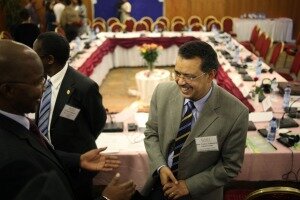Ethiopia's Tedros: Four steps to owning health programs

This is the 10th in a series of posts from the Ministerial Leadership Initiative's Learning Collaborative Forum in Addis Ababa.
At the concluding session today of MLI’s Learning Collaborative Forum in Addis Ababa, the representatives from five Ministries of Health heard from one of the stars of global health who detailed how he’s done something many have dreamed about: Taking country ownership of health programs.
“I think this ownership issue is at the center of all of our activities,” Ethiopia’s Health Minister Tedros Adhanom Ghebreyesus told representatives of five Health Ministries gathered in Ethiopia for the forum. “I can see some change. I have myself been engaged actively for some six years and I have seen good progress not only in Ethiopia but also on our continent. Of course, we say it is still slow, but at least things are moving forward.”
At issue is not only the changing dynamic between donor and recipient in the world of international development, but also the effectiveness of the billions of dollars of aid that flows into Health Ministries around the world each year.
Tedros, and many other officials from Ministries in Senegal, Sierra Leone, Mali, and Nepal attending the session, said that when a country owns its programs, the results are bound to improve and the programs are bound to live on.
He then gave his own roadmap to country ownership, based on four principles:
- You first need a vision. “It all starts from the vision, knowing what to do, having your own plan, knowing what to believe in,” Tedros said. ``Before asking anyone to help, we should have clarity of what we want to achieve. People are ready to help us only when they know what we want.” He said even with a vision, though, leaders should listen well to others, learn from them, and incorporate ideas that make sense.
- Set priorities, funnel resources to them. “First, you need to prioritize your plan. Ownership is about deciding which one of the priorities do you resource. Countries should have the say in setting the priorities but … if you don’t resource the plan, the plan cannot go anywhere.” He said Ministry leaders should make clear to donors and partners about those priorities and negotiate with them to put more funds and technical help toward those goals. “When resources are scarce, you need to make a choice. If I could cover everything, that would be great. I don’t have that choice. I have two bad choices. And I take the least bad.”
- Implement priorities, eliminate duplicative streams of work, build country capacity. “Instead of having a parallel structure, it’s good to use one structure,” he said. “It could be the public sector, or whatever the country wants to operate. If the system is not working, as soon as the project is over, you get nothing.” Tedros gave the example of Ethiopian Airlines, which was established by Americans 60 years ago. Americans ran it for many years and then handed it over to Ethiopians. “Now you can see the country owning one of the best airlines in the world,” he said. “Building the capacity of the country means not putting any parallel structure that could undermine the country’s choice. When you build the capacity of a country, you can sustain it forever.”
- Evaluate the programs vigorously. Tedros said accountability wasn’t a one-way street and that countries needed to show that donor-funded programs achieve results. “During monitoring and evaluation, a country should account for its goals,” he said.
Ethiopia’s priorities are now to improve maternal and child health and fight HIV, tuberculosis and malaria. A fifth area, Tedros said, could be to improve nutrition. He said the “foundation” of the country’s program are the 30,000 all-female health extension workers, who are spread out around the country focusing on primary health care.
“We need to make our efforts women-centered, and we need to use women’s groups to implement the health extension program,” Tedros said.
After his talk, MLI director Rosann Wisman said that Tedros’ message echoed similar ones made by Ministry officials earlier during the forum.
“We’ve spent the whole week talking about these issues, and we know that country ownership doesn’t happen effectively overnight,” she said. “All of our five countries are at different stages. But I think there is a genuine sense of moving in the right direction and we are learning from one another.”
See Minister Tedros' speech below:
Live-blog from Ethiopia:
Part 1: MLI Live-blog from Addis Ababa
Part 2: ‘Its Always Good to Think Big’
Part 3: Mali’s Path to Community Health Insurance
Part 4: ‘A New Dawn’ in Health Care in Sierra Leone
Part 5: Want to Bargain? The Nepalis can Help
Part 6: From Mali to Nepal: The Trail of a Negotiator
Part 7: Ethiopia’s New Plan: ‘It’s going to Really Improve this Place’
Part 8: Ethiopia and the Importance of Family Planning
Part 9: Gang of Four: Table Talk with Reproductive Health Directors
Forum Wrap-up, Part 1: Marty Makinen and Amanda Folsom
Forum Wrap-up, Part 2: Rosann Wisman
Photo Credit Dominic Chavez
Keyword Search
MLI works with ministries of health to advance country ownership and leadership. This blog covers issues affecting the ministries and the people they serve.
Connect with Us
![]()
![]()
Categories
Blogs We Like
- Africa Can End Poverty
- Africa Governance Initiative
- Behind the Numbers
- CapacityPlus
- Center for Global Health R&D Policy Assessment
- Center for Global Development: Global Health Policy
- Center for Health Market Innovations
- Global Health
- Global Health Hub
- Global Health Impact
- The New Security Beat
- PAI Blog
- RH Reality Check
- Save the Children
- Transparency and Accountability Program
Contact Us
Please direct all inquiries to
